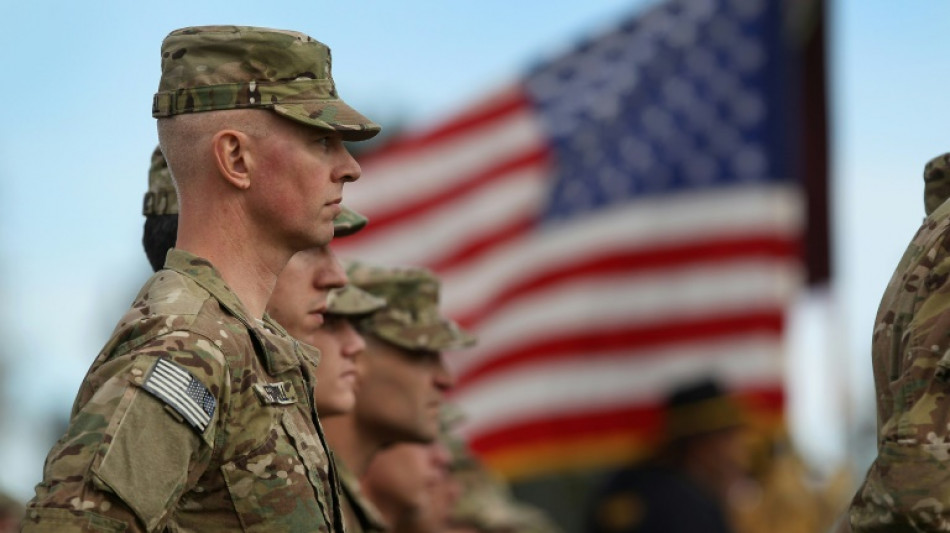
-
 The Jukebox Man on song as Redknapp records 'dream' King George win
The Jukebox Man on song as Redknapp records 'dream' King George win
-
Liverpool boss Slot says Ekitike reaping rewards for greater physicality

-
 Judge jails ex-Malaysian PM Najib for 15 more years after new graft conviction
Judge jails ex-Malaysian PM Najib for 15 more years after new graft conviction
-
Musona rescues Zimbabwe in AFCON draw with Angola

-
 Zelensky to meet Trump in Florida on Sunday
Zelensky to meet Trump in Florida on Sunday
-
'Personality' the key for Celtic boss Nancy when it comes to new signings

-
 Arteta eager to avoid repeat of Rice red card against Brighton
Arteta eager to avoid repeat of Rice red card against Brighton
-
Nigeria signals more strikes likely in 'joint' US operations

-
 Malaysia's former PM Najib convicted in 1MDB graft trial
Malaysia's former PM Najib convicted in 1MDB graft trial
-
Elusive wild cat feared extinct rediscovered in Thailand

-
 Japan govt approves record budget, including for defence
Japan govt approves record budget, including for defence
-
Seoul to ease access to North Korean newspaper

-
 History-maker Tongue wants more of the same from England attack
History-maker Tongue wants more of the same from England attack
-
Australia lead England by 46 after 20 wickets fall on crazy day at MCG

-
 Asia markets edge up as precious metals surge
Asia markets edge up as precious metals surge
-
Twenty wickets fall on day one as Australia gain edge in 4th Ashes Test

-
 'No winner': Kosovo snap poll unlikely to end damaging deadlock
'No winner': Kosovo snap poll unlikely to end damaging deadlock
-
Culture being strangled by Kosovo's political crisis

-
 Main contenders in Kosovo's snap election
Main contenders in Kosovo's snap election
-
Australia all out for 152 as England take charge of 4th Ashes Test

-
 Boys recount 'torment' at hands of armed rebels in DR Congo
Boys recount 'torment' at hands of armed rebels in DR Congo
-
Inside Chernobyl, Ukraine scrambles to repair radiation shield

-
 Bondi victims honoured as Sydney-Hobart race sets sail
Bondi victims honoured as Sydney-Hobart race sets sail
-
North Korea's Kim orders factories to make more missiles in 2026

-
 Palladino's Atalanta on the up as Serie A leaders Inter visit
Palladino's Atalanta on the up as Serie A leaders Inter visit
-
Hooked on the claw: how crane games conquered Japan's arcades

-
 Shanghai's elderly waltz back to the past at lunchtime dance halls
Shanghai's elderly waltz back to the past at lunchtime dance halls
-
Japan govt approves record 122 trillion yen budget
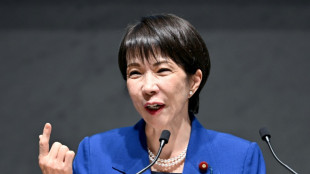
-
 US launches Christmas Day strikes on IS targets in Nigeria
US launches Christmas Day strikes on IS targets in Nigeria
-
Australia reeling on 72-4 at lunch as England strike in 4th Ashes Test
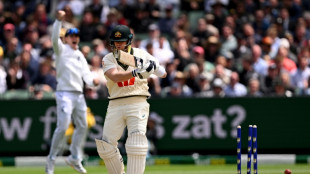
-
 Too hot to handle? Searing heat looming over 2026 World Cup
Too hot to handle? Searing heat looming over 2026 World Cup
-
Packers clinch NFL playoff spot as Lions lose to Vikings

-
 Guinea's presidential candidates hold final rallies before Sunday's vote
Guinea's presidential candidates hold final rallies before Sunday's vote
-
Calvin B. Taylor Bankshares, Inc. Reports Third Quarter Financial Results and Announces New Stock Repurchase Program

-
 Processa Pharmaceuticals and 60 Degrees Pharmaceuticals Interviews to Air on the RedChip Small Stocks, Big Money(TM) Show on Bloomberg TV
Processa Pharmaceuticals and 60 Degrees Pharmaceuticals Interviews to Air on the RedChip Small Stocks, Big Money(TM) Show on Bloomberg TV
-
Aptevo Therapeutics Announces 1-for-18 Reverse Stock Split

-
 Loar Holdings Inc. Announced The Completion of its Acquisition of LMB Fans & Motors
Loar Holdings Inc. Announced The Completion of its Acquisition of LMB Fans & Motors
-
IRS Can Freeze Installment Agreements After Missed Filings - Clear Start Tax Explains Why Compliance Comes First

-
 How the Terms of SMX's $111 Million Capital Facility Shape the Valuation Discussion
How the Terms of SMX's $111 Million Capital Facility Shape the Valuation Discussion
-
A Christmas Message to the DEA's Diversion Anti Marijuana Cabal

-
 QAT Community Sets QuantumTrade 5.0 for Public Beta Testing in March 2026
QAT Community Sets QuantumTrade 5.0 for Public Beta Testing in March 2026
-
BondwithPet Expands B2B Offering with Custom Pet Memorial Product

-
 Best Crypto IRA Companies (Rankings Released)
Best Crypto IRA Companies (Rankings Released)
-
Eon Prime Intelligent Alliance Office Unveils New Brand Identity and Completes Website Upgrade

-
 Villa face Chelsea test as Premier League title race heats up
Villa face Chelsea test as Premier League title race heats up
-
Spurs extend domination of NBA-best Thunder

-
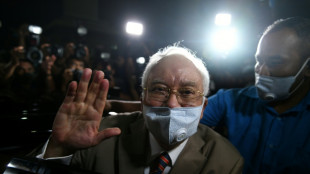 Malaysia's Najib to face verdict in mega 1MDB graft trial
Malaysia's Najib to face verdict in mega 1MDB graft trial
-
King Charles calls for 'reconciliation' in Christmas speech
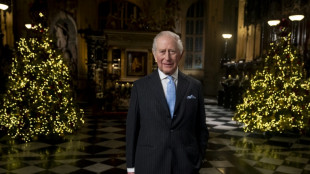
-
 Brazil's jailed ex-president Bolsonaro undergoes 'successful' surgery
Brazil's jailed ex-president Bolsonaro undergoes 'successful' surgery
-
UK tech campaigner sues Trump administration over US sanctions
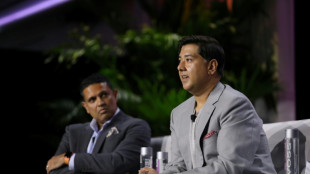

Military rank affects medical care, offering societal insights: study
Human relationships are inherently shaped by power dynamics, yet quantifying their impact has remained a scientific challenge.
Now, a large new study published Thursday in the journal Science reveals that military doctors give more attention to higher-ranked patients, providing concrete evidence about the privileges that come with elevated status, frequently at the expense of the less powerful.
"One of the things we are trying to show is that this is not a military-specific analysis," said co-author Manasvini Singh of Carnegie Mellon University, arguing the findings are just as relevant to civilian life as they are to the rigid chain-of-command structures of the armed forces.
For their research, Singh and co-author Stephen Schwab of the University of Texas at San Antonio examined 1.5 million doctor-patient encounters in the US military health service's records.
Rather than exploring how doctors might respond differently to, say, generals versus privates, they chose a more nuanced approach: comparing how soldiers of equal rank, for example two majors, were treated in emergency departments (EDs) by physicians who either outranked them or were outranked by them.
The "high-power" patients who outranked their doctors received 3.6 percent more effort and resources, as measured by tests, diagnosis and treatment codes, time spent with the physician, and opioids prescribed. High-power patients also had better outcomes, with a 15 percent lower likelihood of hospital admission in the following 30 days.
Further analysis revealed an unwitting spillover effect: low-power patients often received less attention from doctors who had just seen a high-powered patient, possibly due to the extended effort invested in the prior visit.
To ensure their results were generalizable to the population at large, the researchers considered demographic factors like age, race, and sex, which impact outcomes in wider society.
"We found if a patient walks into an ED and is assigned to a white physician who is higher rank than them, the patient is better off being white than black," said Singh.
A Black patient that outranks their white physician receives more effort than if they were lower ranked than their doctor, but still less effort than equivalent white patients. Black physicians on the other hand put in very high effort for high-ranking Black patients.
While the military's ranking system differs from civilian life, Singh argues that other factors, like increased camaraderie and kinship, could mitigate this effect.
The paper's findings even generalize beyond medicine, helping explain why Black students do better under Black teachers or why landlords are more likely to evict vulnerable tenants even when the cash value of missed payments is constant, she said.
In a related commentary, Laura Nimmon of the University of British Columbia said the research raised important questions about whether medical education sufficiently addresses status, authority, and class bias.
"Efforts remain necessary to better understand facets of power, including the failures of education and health care systems to address the myth that physicians are perfectly altruistic and not corrupted by power," she said.
Th.Berger--AMWN


